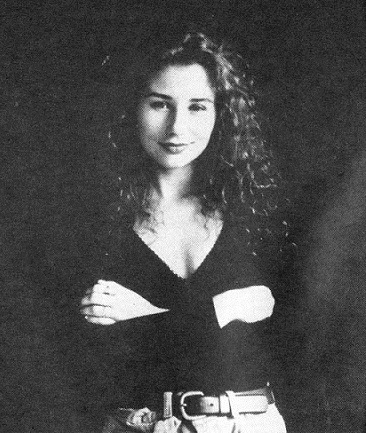|

songs | interviews | photos | tours | boots | press releases | timeline
The Hour (US)
Norwalk, Connecticut, newspaper
April 26, 1994

Singer Tori Amos
Tori Amos continues her healing art
BOSTON -- Violence toward women is an escalating tragedy -- and it shaped the unsettling piano ballads of singer Tori Amos. A former child prodigy, she released a debut album two years ago, "Little Earthquakes," which talked openly about being raped. "It was me and a gun and a man on my back," she sang with telling urgency. The courage to voice her pain helped make the album a stunning success -- and led to a 250-city tour that became a needed therapy session for many women who had experienced similar traumas.
"I met a lot of people on the road," says Amos, who released her second album recently. "One in three had been through some kind of similar experience, which is a lot of people. Those are just the ones who spoke up and got backstage. There was a lot of camaraderie. I feel that admitting things was the door opening."
Amos, 29, continues the healing process with her new album, "Under the Pink," a step forward musically and psychologically. It moves from artful piano melodies to sharp cries of anger leading to self-affirmation. It's unlike any record you'll hear this year. Think of Sinead O'Connor sitting a piano, singing by turns confidently, by turns confidently, by turns desperately, yearning for balance.
"Once you walk through the door," says Amos, "it's a case of 'How do I wake up tomorrow and start living my life without seeing this guy's face in my head every day? Without feeling that if I'm passionate with a man I start to get sick because I associate it with this?' I have to somehow find the tools to get in there and realize that I have a choice on whether I want to be a victim for the rest of my life. ... My feelings change daily about it. Some days I feel completely healed from this, and some days I see myself cowering or getting ridiculously violent. It's one way or the other.
"But I can talk about it now with a bit of separation because I've done so much work on it. What I took out of the experience was hatred for myself. Because this man hated women so much, I took on his hatred. And more than anything, he was about murder. This guy wanted to literally cut me to pieces. Above anything that happened, that has been the thing that I've had to work through. And I've kind of associated it with sex and sexuality, although it's so beyond that.
"It's about trying to change someone's feeling about themselves, about cutting out a part of their soul," says Amos, the Washington, D.C.-based daughter of a Scottish father (who's a Methodist minister) and part-Cherokee Indian mother. "On the one hand, I'd curl up into this little wasted thing and say, 'OK, I am terrible.' Then I went the other way, which is, 'I'm warrior woman of life, and I can slaughter anything.' I couldn't find the balance. The truth is, I've never felt this kind of hatred before, and hatred is a very hard thing to work through your soul."
For Amos, therapy has come via music. "I do it through the songs. I want to make something click inside and get a little flame happening, where you'll go, 'Hey, this touches me,'" says Amos, who entered the Peabody Conservatory in Baltimore when she was only 5. "I think music gets into your molecular structure. I do think it shifts things. You can be riding down the road and hear something and just go, 'Oh my God, I'm never going to be the same again' ... These are the tools I use. Music tools."
Tori write music for her new album, Amos rented a 150-year-old hacienda in New Mexico. "It's near the heart of the Pueblo nation. It just completely disarmed me.
t o r i p h o r i a
tori amos digital archive
yessaid.com
|